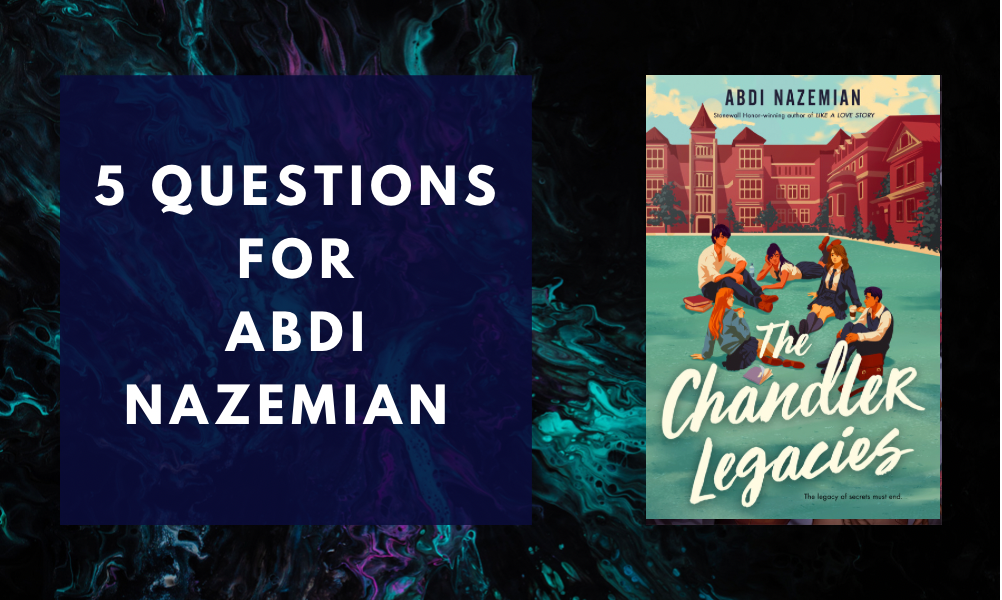Abdi Nazemian is the author of The Authentics. His novel The Walk-In Closet won the Lambda Literary Award for LGBT Debut Fiction. His screenwriting credits include the films The Artist’s Wife, The Quiet, and Menendez: Blood Brothers, as well as the NBC television series The Village. He has been an executive producer and associate producer on numerous films, including Call Me by Your Name, Little Woods, The House of Tomorrow, and Scotty and the Secret History of Hollywood. He lives in Los Angeles with his fiancé and two children. Find him online at www.abdaddy.com.
Voyage: What was the inspiration behind your novel, The Chandler Legacies? What made you want to tell this story?
Abdi Nazemian: My books tend to be what I call emotionally autobiographical. They’re fiction, but they’re emotionally true to my experiences. I went to boarding school for four of the most impactful years of my life. I arrived very much a fish out of water, desperate not to be there. The intense hazing I was subjected to and observed really shook me. But boarding school is also where I met the people who would become my closest friends, and where I first met grown-ups who encouraged me to be creative (which definitely wasn’t encouraged in Iranian culture). I have so many conflicting emotions about my boarding school years, and the book is my way of reflecting on both the anger and the gratitude I have for an experience that shaped me.
V: What was the hardest scene of The Chandler Legacies to write?
The book doesn’t shy away from pretty brutal descriptions of hazing and abuse, and though those scenes were very difficult to write, they were also the most cathartic to write as well. The very first thing I wrote for this book, before it had a plot, was the most brutal hazing scene in Ramin’s dorm, which was based on experiences I had in my own boarding school basement dorm. It felt very hard to get that scene out, but that scene also unlocked what I knew the book had to be, which was unflinching in its depiction of what these students were going through. So I suppose that was the hardest scene to write, because it was the first and the blank page is scary, and also because it was so close to my own experience, and revisiting the most difficult moments of our own youth is also scary.
V: What is the one thing you hope readers will take away from The Chandler Legacies?
AN: I view all my books as hopeful because, for me, the act of creativity is a hopeful one. Turning the messiness and pain of life into art helps us make sense of it all, and helps us find a more honest and empathetic way forward. I definitely hope readers will think about the power and responsibility of creativity when they put this book down, and perhaps feel compelled to create themselves. The book is about a writing workshop called The Circle. Perhaps some readers will write alongside the students. It would be really cool if readers decided to try some of Professor Douglas’s writing prompts and exercises themselves.
V: What’s the best piece of writing advice you’ve ever received?
AN: Never to self-edit when writing a first draft. I learned this lesson in college when a professor asked us to write a story using spontaneous prose, without ever stopping, not even to fix typos or errors. I’ve never written the same way since. I’m also a big, big fan of the book The Artist’s Way, which is a twelve-week creativity workshop. The tools the book suggests—especially journaling—are tools I still use.
V: Where do you find inspiration for your stories?
AN: Going back to the earlier question, journaling is a big part of my process. I want my books to be personal, honest, and necessary for me to write. That requires periods of rest where I’m reading, living, and most importantly journaling. It’s often in my journals that I start to uncover the things that are consuming me, and those are the things I need to be writing about and making sense of through fiction.
Head to our Instagram page (@voyageya) to hear Abdi read the first page of The Chandler Legacies! Find Abdi’s video under the IGTV tab.
